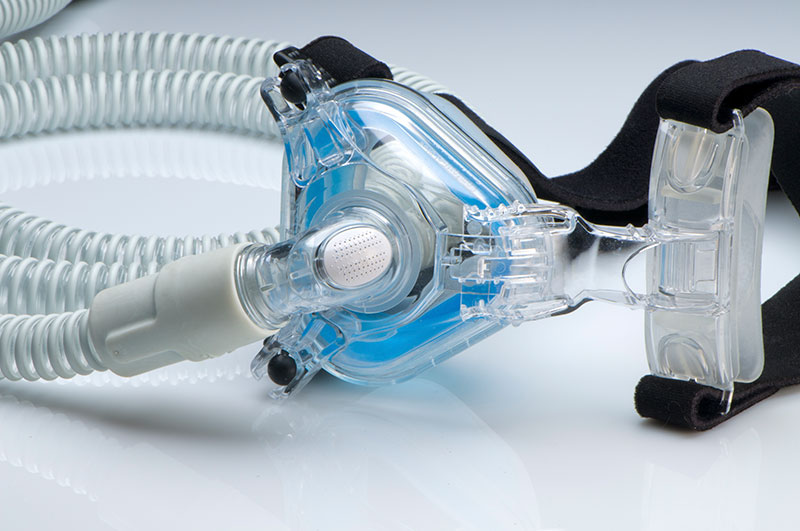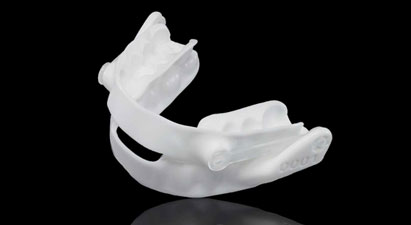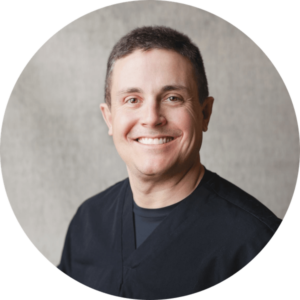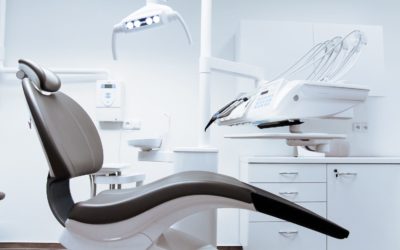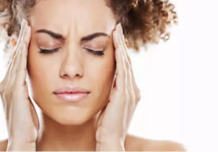Sleep Apnea is a dangerous sleep disorder because it literally stops your breathing during sleep. Usually it’s only for a few seconds before the body snorts or coughs to restart breathing. But extreme cases can be fatal: former NFL star Reggie White died from it.
It’s also surprisingly common. Approximately 15% of American adults have sleep apnea, and 2-4% of American children also have it. (source)
There are two kinds of Sleep Apnea: Obstructive Sleep Apnea (OSA) and Central Sleep Apnea (CSA).
Obstructive Sleep Apnea (OSA) Definition
“Obstructive sleep apnea (OSA) is a disorder in which a person frequently stops breathing during his or her sleep. It results from an obstruction of the upper airway during sleep that occurs because of inadequate motor tone of the tongue and/or airway dilator muscles.” (source)
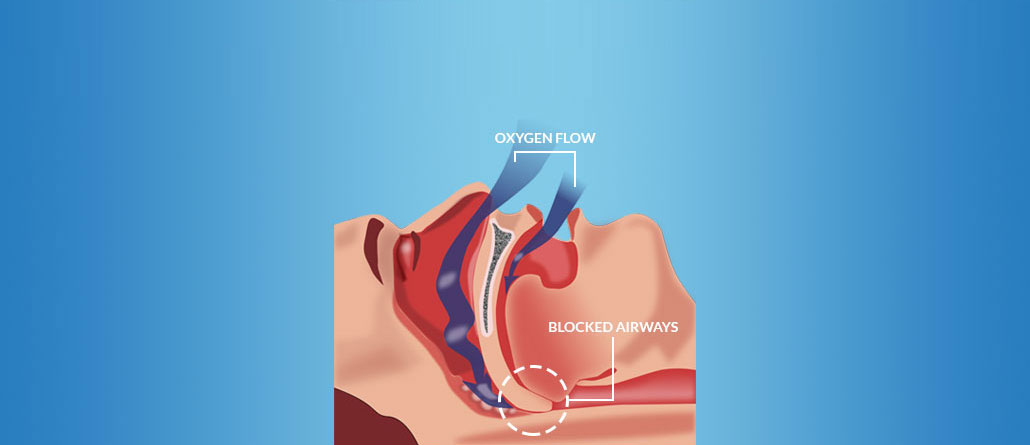
Central Sleep Apnea (CSA) Definition
“Central sleep apnea is a disorder in which your breathing repeatedly stops and starts during sleep. Central sleep apnea occurs because your brain doesn’t send proper signals to the muscles that control your breathing. This condition is different from obstructive sleep apnea, in which you can’t breathe normally because of upper airway obstruction. Central sleep apnea is less common than obstructive sleep apnea.” (source)
Sleep Apnea Dangers
1. High blood pressure
If you already have it, sleep apnea can make it worse. Frequent nighttime wakings cause hormonal systems to go into overdrive, which results in high blood pressure levels at night. source source
2. Heart Disease, Strokes, and Sudden Death
OSA increases the risk of stroke, heart attacks, and abnormal heartbeats like atrial fibrillation and arrhythmias. source source source source
According to the Mayo Clinic, people with sleep apnea are more likely to die suddenly from a heart rhythm problem during sleeping hours. source
“Obstructive sleep apnea was independently associated with increased troponin T, heart failure, and death in women, but not in men. And in women, but not men, sleep apnea was associated with an enlarged heart, another risk factor for cardiovascular disease.” source
“Cardiovascular trouble was three times more likely in men with severe untreated sleep apnea than it was in men with treated sleep apnea.” (source)
3. Type 2 diabetes
Sleep apnea is common among people with this condition – 80% or more of them may have OSA. Obesity raises a person’s risk for both disorders. source
4. Weight gain
Extra pounds raise your chances of getting sleep apnea, and the condition also makes it harder to lose weight. Half of overweight people have sleep apnea – partly because of the extra weight that collects around the neck, making it harder to keep breathing at night. source source
5. Headaches
Do you often wake up with a headache? Researchers found a connection between frequent morning headaches and sleep disorders including insomnia and sleep apnea. source source
6. Acid reflux / GERD (Gastroesophageal reflux disease)
People who have sleep apnea also may have GERD because of the disordered way in which their throat closes while air moves in and out during sleep, causing pressure changes that can suck the contents of their stomach back up into the esophagus. source source
7. Accidents
People with sleep apnea are up to five times more likely than normal sleepers to have traffic accidents (source). People with sleep apnea have an increased risk of motor vehicle and workplace accidents. (source)
8. Mental Health Issues
Sleep apnea can affect your mental well-being, leading to issues from crankiness from a lack of sleep to serious depression. The more daytime sleepiness people report, the greater their chances of also having mild depression or anxiety symptoms (source source). The greater the severity of your sleep apnea, the greater your likelihood of feeling depressed. (source). You may also feel quick tempered, moody or depressed. Children and teens with sleep apnea may do poorly in school or have behavior problems. (source)
9. Daytime fatigue
Repeatedly waking up at night makes normal, restful sleep impossible. People with sleep apnea often experience severe daytime drowsiness, fatigue and irritability. (source)
10. Difficulty Concentrating
You may have difficulty concentrating and find yourself falling asleep at work, while watching TV or even when driving.
11. Liver problems
People with sleep apnea are more likely to suffer from a condition known as nonalcoholic fatty liver disease. (source)
12. Metabolic syndrome
This disorder is a collection of other risk factors linked to a higher risk of heart disease. The conditions that make up metabolic syndrome include high blood pressure, abnormal cholesterol, high blood sugar and an increased waist circumference.
13. Complications with medications and surgery
People with sleep apnea may be more likely to experience complications following major surgery because they’re prone to breathing problems, especially when sedated and lying on their backs. Before you have surgery, tell your doctor that you have sleep apnea and how it’s treated. (source)
14. Sleep-deprived partners
Loud snoring can keep those around you from getting good rest and eventually disrupt your relationships. It’s not uncommon for a partner to go to another room, or even on another floor of the house, to be able to sleep. (source)
15. Lower Grades in School (for children)
Since sleep apnea affects your mental functioning, it can deeply impact school-age children. According to recent research analysis of 16 published studies, kids with sleep apnea tend to struggle in school and perform worse in language arts, math, and science compared to those who do not have sleep or breathing problems. (source)
Ultimately sleep apnea can be thought of as “interrupted sleep”. This lack of proper sleep causes you to be very tired the next day and can have an indirect affect on many aspects of your life. For example, when you’re too tired, you are less likely to feel like working out, which then leads to weight gain, which can lead to diabetes and other complications. However, in contrast, getting the right amount of sleep can turn around these things for the better. If you are well-rested, you’ll have more energy to exercise, lose more weight, and thus reduce the risks associated with sleep apnea. Simply getting a good night’s sleep can make a world of difference!
Do you have these Sleep Apnea symptoms?
- Loud snoring – strong indicator of obstructive sleep apnea
- Frequently stop breathing during sleep, as witnessed by another person
- Abruptly waking up and being short of breath – strong indicator of central sleep apnea
- Waking up with a dry mouth or sore throat
- Morning headache
- Difficulty staying asleep (insomnia)
- Excessive daytime sleepiness (hypersomnia)
- Attention problems
- Irritability
(source)
Obstructive Sleep Apnea Risk Factors
- Excess weight. People who are obese have 4x the risk of sleep apnea than people who are a normal weight people do. But not everyone who has sleep apnea is overweight.
- Neck circumference. People with thicker necks may have narrower airways. For men, the risk increases if neck circumference is 17 inches (43 centimeters) and larger. In women, the risk increases if neck circumference is 15 inches (38 centimeters) or more.
- A narrowed airway. You may have inherited a naturally narrow throat. Or, tonsils or adenoids may become enlarged and block the airway, particularly in children with sleep apnea.
- Being older. Sleep apnea occurs significantly more often in older adults.
- Family history. If you have family members with sleep apnea, you may be at increased risk.
- Use of alcohol, sedatives or tranquilizers. These substances relax the muscles in your throat.
- Smoking. Smokers are 3x more likely to have obstructive sleep apnea than are people who’ve never smoked. Smoking may increase the amount of inflammation and fluid retention in the upper airway. This risk likely drops after you quit smoking.
- Nasal congestion. If you have difficulty breathing through your nose — whether it’s from an anatomical problem or allergies — you’re more likely to develop obstructive sleep apnea.
Central Sleep Apnea Risk Factors
- Being older. Middle-aged and older people have a higher risk of CSA.
- Heart disorders. People with congestive heart failure are more at risk of CSA.
- Using narcotic pain medications. Opioid medications, especially long-acting ones such as methadone, increase the risk of CSA.
- Stroke. People who’ve had a stroke are more at risk of central sleep apnea or treatment-emergent CSA.
Sleep Apnea Treatments
- Return to normal weight
- Use a CPAP machine. CPAP stands for Continuous Positive Airway Pressure. Ask Dr. Luther if CPAP is right for you.
- Use mouth appliances like the NTI-tss Plus to prevent muscle contractions and keep your airways open. Our very own Dr. Luther wears one. Ask him if it’s right for you.
